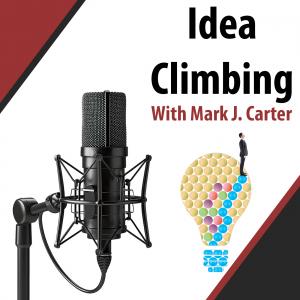The Idea Climbing Podcast

How to Clearly Communicate Your Big Idea with Steve Woodruff
If you want to share and clearly communicate your big idea you need to do it in small chunks of information, not a long presentation. Your big idea has to be shared in a small package. You can’t dump a ton of information on people all at once, they’re not ready to process all of that information. You understand your big idea because it sprang to life in your mind. You’ve probably researched it, mulled it over and worked on it for a while. The temptation is to try to share everything you know at once. When people listen to you, they’re tuning in to find out whether your big idea is valuable to them. Because of that you need to compress your big idea into short sound bites that are very relevant and very compelling because the attention span you get from other people is limited. If you try to say too much, you lose the opportunity to fully share your big idea. You start to compress your big idea by asking yourself “Why does this matter to the audience I’m talking to?” You must frame it in a “What’s in it for them?” package, why should THEY care? Strip out 95% of the things you’d like to say and only share the things that are relevant to them, so they’ll do what you want them to do, become a client, support your big idea, etc. It still needs to be a small message even if the solution you’re offering is a complex solution. How to Know What to Cut Out and What to Leave in Consider writing and marketing a book. The title and the subtitle are the hook. The table of contents is the next level of detail; it’s the scannable outline. The rest of the book is the details. The three strata are the main point, overview then the rest of it. This is true for your service offerings, pitches to investors or any other big idea that you’re trying to get across. Consultants are trained to do this all the time, clinical papers are written this way, and so on. This is what Steve calls a “brain friendly approach”. Your listener wants to know what matters right away then, if you’re successful with your communication, they’re prepared to listen to a little bit more. If that works, they’re ready to listen to the details. Most of the time they don’t want a lot of detail, especially right up front. Start With the Bottom Line When people get a chance to present to their target audience, often they try to say too much. What their audience wants often is the “BLUF”, or Bottom-Line Up Front. They don’t have time to wait 30 minutes for you to get to the conclusion. Give them the conclusion immediately and if they’re interested you can dig deeper if you have time. This is why you need a “brain friendly format” so that you get an opportunity to talk about the details when your target audience is receptive to listening to more. “Begin with the end in mind” ~Steven Covey In this episode we also discuss: The four rules of successful communication. The definition of a “Memory Dart” and how to create one. How to create communication agreements. The components of a “Lead Point” and how to create one. …and other golden nuggets of advice! You can get my book here: “Idea Climbing: How to Create a Support System for Your Next Big Idea” About the Guest Steve Woodruff is known as the King of Clarity. Thirty-seven years in the front lines of sales, marketing, consulting, and entrepreneurship has uniquely equipped Steve to guide others in the principles and practices of clear and effective communication. He has deep experience in corporate training and workshop facilitation for a wide variety of companies, from startups to Top Five pharma. Steve is the author of the business book Clarity Wins (2018), and the ground-breaking new book The Point (October 2023). He is the father of 5 grown men and lives in Franklin TN with his wife of 42 years. Connecting with Steve Email: steve@stevewoodruff.com Website: https://www.stevewoodruff.com






 Visit Podcast Website
Visit Podcast Website RSS Podcast Feed
RSS Podcast Feed Subscribe
Subscribe
 Add to MyCast
Add to MyCast